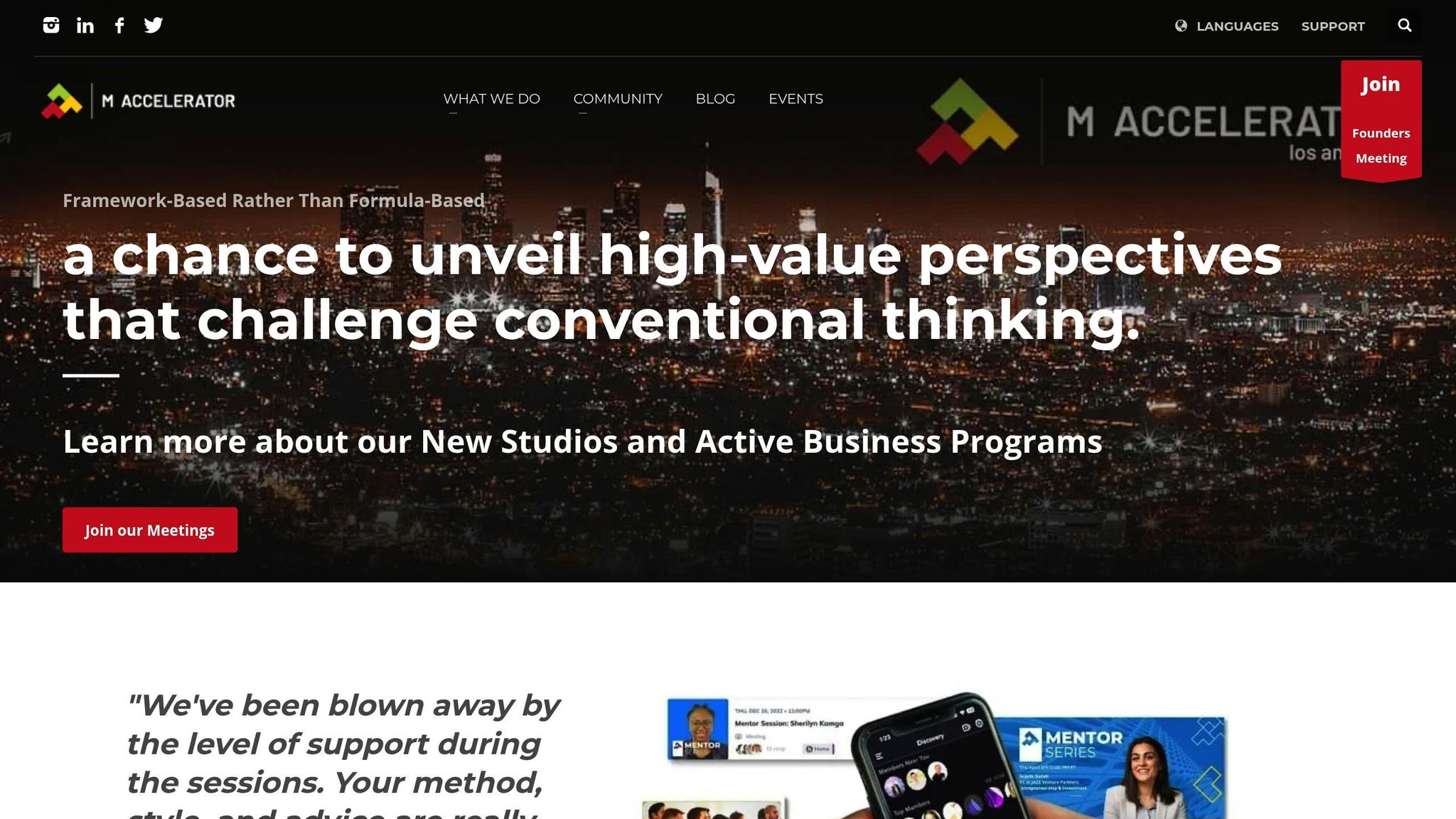
Negotiation is a critical skill for startups. It can mean securing 30% more funding or forming partnerships that drive growth. But 70% of founders struggle due to limited resources and preparation. Here’s how to turn the odds in your favor:
Key Takeaways:
- Preparation matters: Research your counterpart, define goals, and highlight your strengths.
- Build trust: Establish rapport, listen actively, and find common ground.
- Focus on win-win deals: Spot shared opportunities and trade smartly.
- Communicate effectively: Ask the right questions and read body language.
- Secure agreements: Use clear contracts and set up dispute resolution processes.
Mastering these strategies can help you close better deals, protect your interests, and create lasting partnerships. Let’s dive in.
Negotiation Skills for Startup Founders
Pre-Negotiation Planning
Proper preparation can greatly improve the outcome of any negotiation. Studies indicate that companies engaging in detailed pre-negotiation research are 30% more likely to secure favorable results in partnership discussions.
Know Your Counterpart
Doing your homework on the other party is essential. Focus on areas like their financial standing, strategic goals, key decision-makers, and past negotiation behavior:
- Financial health: Look into public financial statements, funding history, and market performance.
- Strategic goals: Understand their business model, growth plans, and competitive position.
- Decision-makers: Research the backgrounds and negotiation styles of key executives.
- Past behavior: Review their history in similar negotiations.
"Understanding your counterpart’s motivations and constraints is crucial for successful negotiations." – John Doe, Negotiation Expert, Business Insights Inc.
Set Your Goals
Clearly defining your priorities is critical. Break them down into three categories:
| Priority Level | Description | Examples |
|---|---|---|
| Must-haves | Non-negotiable terms essential for success | Minimum revenue share, IP protection |
| Nice-to-haves | Flexible terms that add value | Marketing support, extended payment terms |
| Deal-breakers | Conditions that would force you to walk away | Loss of brand control, excessive dilution |
Keep these priorities in mind but remain open to adjustments as discussions progress. According to M Accelerator, founders who stay adaptable while safeguarding their core needs tend to form stronger, long-lasting partnerships.
Know Your Strengths
Identify and emphasize what sets your startup apart. These can be categorized into tangible and intangible strengths:
Tangible Strengths:
- Proprietary technology
- Loyal customer base
- Consistent revenue growth
- Products validated by the market
Intangible Strengths:
- Deep industry knowledge
- First-mover advantage
- Highly skilled team
- Unique market insights
When presenting these strengths, back them up with specific data or examples. For instance, instead of saying, "We have great technology", explain how your product delivers measurable improvements or outperforms competitors in key areas.
To refine your pitch, consider working with mentors or running practice sessions. This preparation will help you communicate confidently, build trust, and position yourself strongly for a mutually beneficial agreement.
With your research and goals in place, the next step is building trust with your negotiation partner.
Building Trust
Once you’ve done your research and set clear goals, the next step is building trust with your negotiation partner. Trust is the foundation of any successful negotiation.
Make Connections
Start by identifying shared values and goals before diving into the details. This sets the stage for open conversations about needs and concerns.
Here are some ways to establish trust:
| Connection Point | Purpose | How to Do It |
|---|---|---|
| Pre-meeting Research | Find common ground | Look into their mission, values, and recent achievements. |
| Initial Contact | Build rapport | Arrange informal meetings or casual conversations. |
| Follow-up Communication | Keep the connection alive | Share meeting summaries and regular updates. |
M Accelerator emphasizes the importance of informal relationship-building for top founders:
"Trust is built through consistent actions and open communication." – M Accelerator
Once you’ve established a connection, active listening becomes crucial to deepen mutual understanding.
Listen Well
Did you know effective listening can improve negotiation results by up to 30%?
Here’s how to practice reflective listening:
- Paraphrase key points to confirm you’ve understood correctly.
- Address concerns before giving your response.
- Ask follow-up questions to clarify any uncertainties.
For the best results, create an environment that encourages focus:
- Pick a quiet location for meetings.
- Limit digital distractions like phones or laptops.
- Maintain good eye contact and use positive body language.
As John Doe from Business Insights Inc. puts it:
"Active listening is not just about hearing words; it’s about understanding the message behind them."
Earning trust takes time and consistent effort. But when trust is established, it creates a solid foundation for productive and clear negotiations.
Win-Win Deal Making
Turning preparation and trust into action, win-win deal making focuses on creating agreements where both sides benefit. By identifying shared opportunities, you can form partnerships that are both lasting and profitable.
Find Shared Gains
The heart of successful negotiations lies in spotting opportunities where both parties achieve their goals together. This approach lays the groundwork for partnerships driven by mutual success.
Take a look at how startups often structure win-win partnerships:
| Partnership Element | Your Benefit | Partner’s Benefit |
|---|---|---|
| Revenue Sharing | Steady cash flow | Incentive to support your success |
| Joint Marketing | Access to fresh audiences | Broader market exposure |
A standout example of this is the March 2023 collaboration between Spotify and Mailchimp. Their joint marketing efforts drove a 25% rise in user sign-ups within just two months.
"Successful partnerships are built on a foundation of shared goals and mutual benefits." – John Doe, Partnership Manager, Mailchimp
Once shared gains are identified, the next step is to negotiate terms strategically.
Trade Smart
Effective negotiation is about knowing which terms are critical and which can be adjusted. This ensures your key interests are protected while maintaining a positive relationship with your partner.
Here are some examples of strategic trading:
| Priority Level | Tradeable Items | Non-Negotiable Items |
|---|---|---|
| High Priority | Minor operational details | Core revenue agreements |
| Medium Priority | Flexible timelines | Key performance indicators |
| Low Priority | Optional features | Essential intellectual property rights |
M Accelerator’s training highlights the value of understanding your partner’s priorities. By recognizing what matters most to them, you can make concessions on less critical terms to secure valuable outcomes.
When negotiating terms, keep these strategies in mind:
- Identify what’s non-negotiable for your business
- Understand which terms matter most to your partner
- Bundle terms to create leverage
- Be upfront about your limitations
"Successful negotiations are about finding the balance between what you need and what your partner values." – John Smith, Negotiation Expert, Business Insights Inc.
Creative solutions often lead to the best outcomes. For instance, in January 2022, Company A and Company B formed a partnership by sharing marketing resources instead of requiring upfront payments. This led to a 25% sales increase for Company A within six months [2].
sbb-itb-32a2de3
Communication Skills
Once trust is built and win-win deals are on the table, clear communication ensures these strategies turn into actionable agreements.
Strong communication is at the heart of startup negotiations – non-verbal cues alone account for up to 93% of the process.
Ask Good Questions
The right questions can uncover priorities and lead to solutions that work for everyone.
Here’s a quick breakdown of how different question types can be used effectively during negotiations:
| Question Type | Purpose | Example Question | When to Use |
|---|---|---|---|
| Clarifying | Ensure understanding | "Could you explain what you mean by revenue sharing?" | When details are unclear |
| Probing | Uncover deeper needs | "What challenges does this partnership need to address?" | To identify pain points |
| Hypothetical | Explore possibilities | "How would you envision the first 90 days of collaboration?" | When discussing future scenarios |
| Reflective | Build rapport | "It seems pricing is a key concern – what specific aspects worry you?" | To show active listening |
Asking thoughtful questions encourages open dialogue. Combine this with an understanding of non-verbal cues to enhance your negotiation skills.
Read Body Language
Non-verbal communication plays a huge role in negotiations. By accurately interpreting body language, you can strengthen your position and better understand the other party.
"Understanding body language is essential for effective negotiation, as it can reveal what a person is truly feeling beyond their words." – Dr. Albert Mehrabian
Here are some key signals to watch for:
- Confidence Indicators
Look for open posture, steady eye contact, and controlled gestures. - Warning Signs
Be cautious of crossed arms or legs, reduced eye contact, excessive fidgeting, or forced smiles. - Engagement Signals
Signs like leaning forward, consistent eye contact, responsive nodding, and natural hand movements show interest and involvement.
Always interpret these signals as part of a bigger picture, keeping in mind cultural norms and individual behaviors for accurate reading.
Legal and Money Matters
Once you’ve nailed communication, it’s time to focus on securing your agreements with solid legal and financial terms. These steps are essential to protect your startup and avoid potential disputes.
Contract Basics
A well-drafted contract is the backbone of any partnership. Here’s a breakdown of key elements to include:
| Contract Element | Purpose | Key Considerations |
|---|---|---|
| IP Rights | Safeguard intellectual property | Clearly define ownership of new developments and set licensing terms |
| Exclusivity | Set partnership boundaries | Specify exclusivity, including geographic or competitive limitations |
| Termination | Clarify exit conditions | Outline notice periods and asset distribution obligations upon ending the agreement |
| Confidentiality | Protect sensitive information | Include NDA terms and data handling requirements |
Make sure your contracts cover the following:
- Have a legal expert review all agreements.
- Include clear performance metrics and deliverables.
- Define payment terms and schedules.
- Put verbal agreements in writing.
- Set up regular review periods to revisit terms.
Solve Disagreements
Disputes can arise even in the best partnerships. A structured approach to resolution can save time and preserve relationships.
- Start with Mediation
Mediation is a practical first step for resolving conflicts. It’s cost-effective and allows both parties to collaborate on a solution without escalating tensions. This method also helps maintain the partnership’s integrity.
- Move to Arbitration if Necessary
If mediation doesn’t resolve the issue, arbitration provides a more formal process. Make sure your arbitration clause includes:
- How arbitrators will be selected
- How costs will be shared
- Expected timelines for resolution
- Whether decisions are binding
- Keep Detailed Documentation
Maintaining thorough records is crucial. Be sure to document:
- Written communications
- Meeting notes and decisions
- Any changes to agreements
- Performance metrics
- Payment records
When drafting dispute resolution clauses, clearly state:
- Which issues require mediation versus arbitration
- Timeframes for each step of the process
- The location and jurisdiction for resolving disputes
- How costs will be divided
M Accelerator Support

M Accelerator helps startup founders in Los Angeles turn negotiation strategies into real-world success. By providing practical tools and guidance, it helps founders navigate and excel in partnership negotiations.
Training Options
M Accelerator offers tailored programs designed to sharpen negotiation skills:
| Program | Focus Areas | Key Benefits |
|---|---|---|
| Founders Studio | Product-Market Fit | Learn to define your value proposition for better deals |
| Startup Program | Strategic Growth | Practice with real-world scenarios and role-playing |
| Scale-Up Coaching | Partnership Strategy | Get one-on-one advice for handling complex deals |
Each program is limited to small cohorts of 4-5 businesses, ensuring personalized attention.
"We’ve been blown away by the level of support during the sessions. Your method, style, and advice are really wonderful." – Abi Hannah, CEO at Fertility Circle
Hands-On Learning
M Accelerator goes beyond theory with practical, hands-on training:
- Strategic Framework Development: Create a clear roadmap to identify leverage points and mutual benefits.
- Multi-Modal Training: Participate in workshops, coaching sessions, and peer discussions to master negotiation skills.
- Real-World Application: Practice negotiation techniques through simulated scenarios based on actual business cases.
"After this startup program, I have a lot more clarity in which direction we should take, which tools we can use, and how we can go about it." – Melissa Kariuki, Founder at Whip Music Africa
Whether you’re running an early-stage startup or a pre-IPO company with over 100 employees, M Accelerator’s coaching bridges the gap between strategy and real-world negotiation challenges.
"M Accelerator is a great starting point for anyone who is considering taking the leap to start a company. It provides mentorship, support from the community, and networking opportunities." – Ellen Deng, Founder at Vinofy
Conclusion
Knowing how to negotiate effectively is a crucial skill for any startup looking to thrive. Research shows that negotiators who build trust can achieve outcomes that are up to 20% better than those who don’t. This highlights the importance of combining relationship-building with technical expertise.
Successful negotiations rely on a mix of preparation, trust, and clear communication. Together, these elements help create partnerships that benefit everyone involved while safeguarding your business goals. Here are the key components:
- Preparation: Do your homework on the other party and define your objectives clearly.
- Trust: Build real connections through active listening and understanding.
- Value creation: Look for mutual benefits and make smart compromises.
- Communication: Pay attention to both verbal and non-verbal signals.
- Legal framework: Use well-structured contracts to protect your interests.




